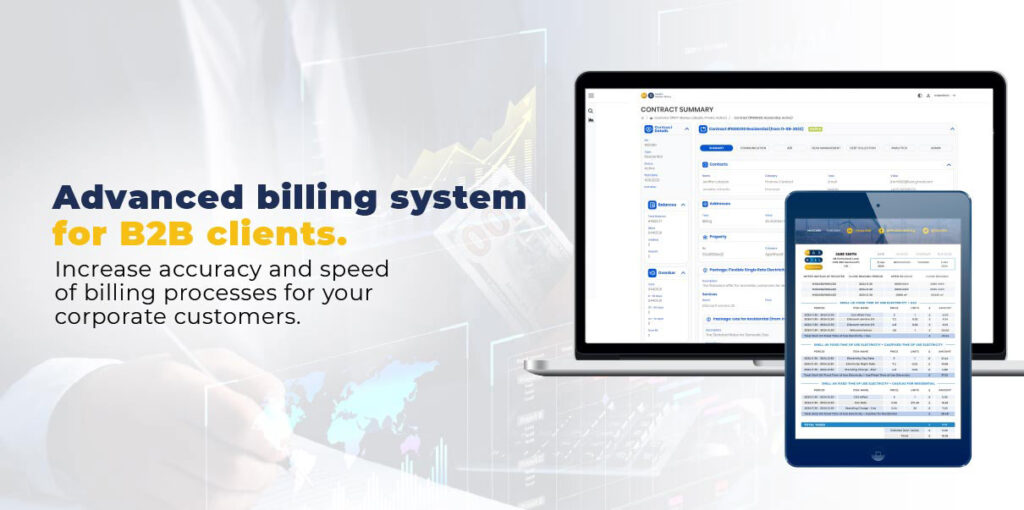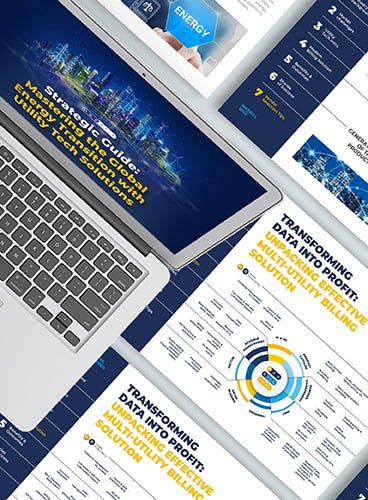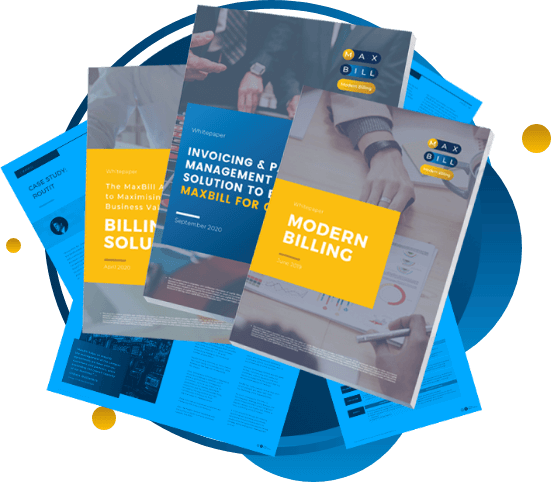One of the largest electricity suppliers in the Eastern Europe (details under NDA), partnered with MaxBill, is actively implementing innovative approaches to serving both residential and corporate consumers. A key focus area for the company is digital transformation, particularly the enhancement of billing, act generation, and tax invoice processes for industrial enterprises and the commercial segment.
Namely, their contract management often suggests dynamic consumption patterns, individualised pricing rules, and tight deadlines between data from operators and required charging.
With this case study, we’ll show how energy companies, especially those serving the business segment, can optimise billing and reporting processes under the conditions of hourly consumption, complex contract logic, high invoice volumes, and tight time constraints.

Challenges and problem statement
Let us dive deeper into each challenge:
- Hourly Metering Complexity: B2B clients are billed based on hourly consumption. However, final consumption data from operators typically arrives only by the 8th–9th day of the month, close to billing deadlines.
- Frequent Recalculations: Late data submission and frequent consumption adjustments required recalculating large volumes of billing points in short timeframes.
- High Volume of Invoices: With a large B2B client base, the number of invoices and credit/debit notes ballooned quickly, putting pressure on operational teams.
- Advanced Contract Logic: Contracts involved a variety of parameters, including penalties, multipliers, coefficients, and individual pricing conditions, which needed to be accurately accounted for.
- Regulatory Documentation and Tax Generation: Legal and fiscal compliance demanded precise generation of tax documents and supporting billing records in line with national standards.
The business transformation strategy
Scaling precision and speed in complex B2B billing operations
To address these challenges and future-proof its operations, the company partnered with MaxBill to implement a convergent billing and customer management system specifically suited to high-volume, multi-parameter environments.
Key implementation highlights:
- Automated recalculation engine: MaxBill’s powerful recalculation logic allowed it to process hourly consumption data from thousands of metering points efficiently, even when updates arrived close to billing deadlines.
- Contract-based pricing engine: Each client’s contract conditions, penalties, coefficients, and price formulas, are now configured directly in the system, enabling automatic and transparent pricing.
- Invoice consolidation and documentation: MaxBill generated compliant tax documentation and consolidated invoices with full traceability across all contract elements, significantly reducing manual workload.
- Scalability for adjustments: Whether consumption needed to be adjusted for a day, a week, or a month, MaxBill handled batch updates and recalculations without disrupting billing timelines.
Outcomes and global results
Even with delayed input data, the company now meets tight billing deadlines with a high degree of accuracy. The other outcomes include:
- Reduced operational load: Automation drastically reduced the time and resources needed for recalculations and manual invoice corrections.
- Improved customer satisfaction: Clients benefit from invoices that clearly reflect their actual consumption and individual contract logic, boosting trust and retention.
- Full regulatory compliance: All fiscal and tax documentation is generated on time and in full alignment with legal standards.
- Strategic readiness: With MaxBill, the energy supplier is now better equipped to introduce dynamic pricing models and new B2B services, including those supporting Ukraine’s ongoing energy transition.
Addressing other business needs: managing accounts receivable
MaxBill helps energy companies manage accounts receivable effectively through:
- automated and configurable debt collection workflows;
- customer segmentation and tailored collection strategies;
- risk prediction and scenario modeling;
- transparent communication with clients;
- detailed analytics and reporting.
So how exactly does MaxBill support receivables management?
Automation and configurable workflows
MaxBill integrates debt management capabilities directly into its core billing platform, allowing utilities to configure multiple collection scenarios based on contract segments, payment schemes, and business rules.
Automated notifications and reminders improve communication with clients: the system generates alerts for overdue payments and dispatches invoices according to pre-set workflows, significantly reducing the load on customer service teams.
Segmentation and personalized approach
MaxBill enables segmentation of customers by risk sensitivity, from large enterprises to the commercial segment, and allows each group to have a customized debt lifecycle, contact frequency, and repayment terms.
It also collects creditworthiness data via external APIs, enabling utilities to assess financial profiles and apply more precise collection strategies.
Analytics and ML-driven forecasting for B2C
With built-in machine learning models, MaxBill can predict which customers are likely to leave, identify key risk drivers, and simulate multiple “what-if” debt collection scenarios.
This empowers companies to act proactively, not just reactively, forming optimal collection strategies early to minimize financial losses and stabilize cash flow.
Customer-centric collection
Thanks to an advanced reminder and notification system, customers receive clear, timely information about their debts and repayment terms, making the process transparent and human-centered.
This reduces the risk of conflict, builds trust, and lowers dissatisfaction among mid-sized and large business clients.
Real-time reporting
MaxBill provides a comprehensive suite of analytics and reports on collection performance, debt accumulation trends, customer segmentation, and model effectiveness, helping finance teams quickly adjust strategies and optimize collections.
Summing up: your go-to modern billing solution
MaxBill has been around for 29 years, delivering impactful billing solutions for telco, energy and utilities, and iGaming. Having a mature product, being cross-border-savvy, and having expertise in billing for different domains in different regions – these things make us a go-to billing solution for any business model and any billing scenario. We combine experience and innovation in our solutions! Reach out to our team to find the solution for your particular business case.

































